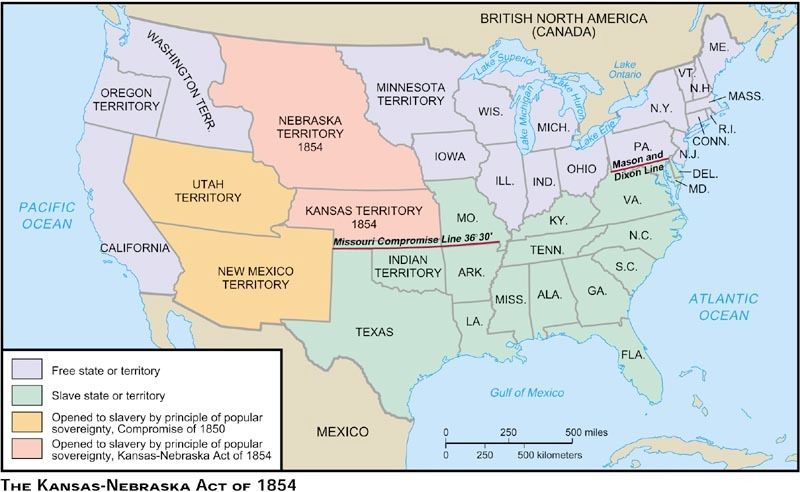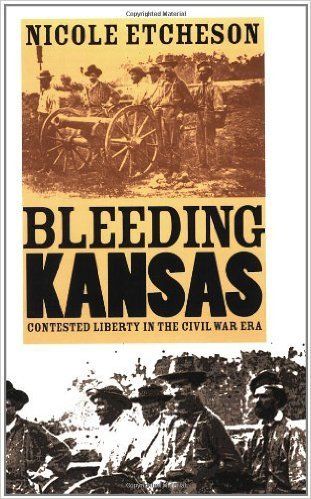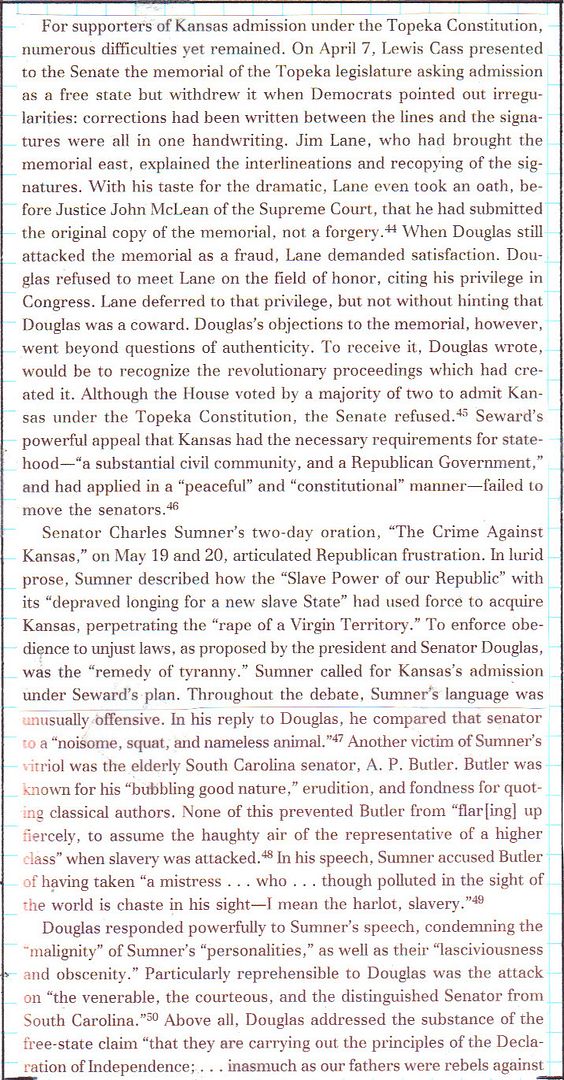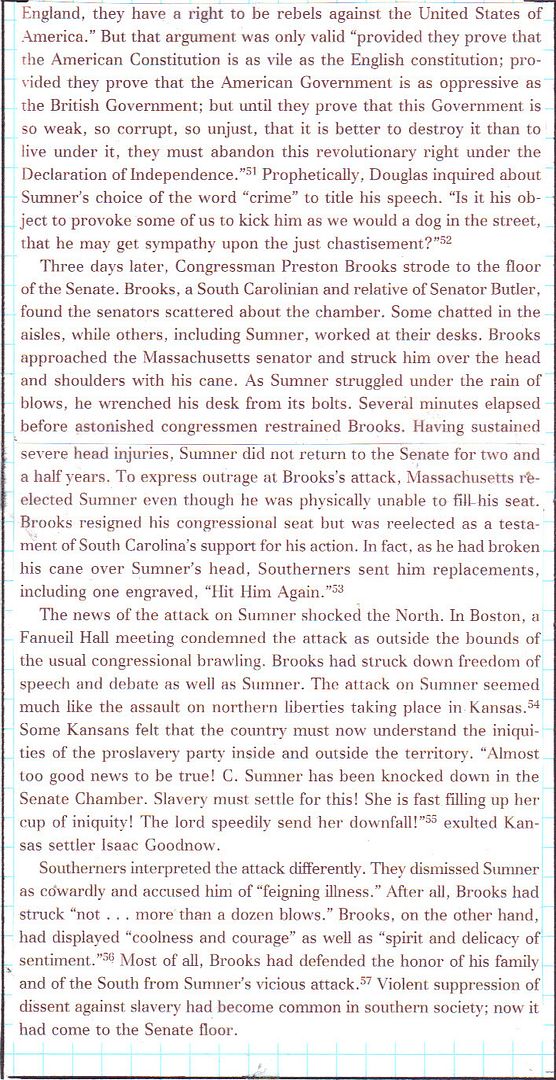
Posted on 04/01/2016 5:01:32 AM PDT by Homer_J_Simpson


Ulysses S. Grant (around 1852 while stationed in California)

Robert E. Lee (circa 1856 while assigned to Texas)
No matter how much things change, the more they stay the same.
This month is significant not so much for what happened, but instead in slow emotional boil that is occurring under the surface.
We are about six weeks out from the caning of Sen. Sumner by Rep. Brooks on the Senate floor.
It wasn’t apparent to the broader public at the time, but this point in 1856 was when violence began to become a preferred option among a small but growing portion of both anti and pro-slavery factions.
The passions that are being barely held in check at this point in 1856 make the current disputes between Trump and Cruz look like toddlers fighting over toys.
Great post.
On March 4, 1856, the Topeka legislature met and approved a memorial, addressed to Congress, seeking admission of Kansas as a state under the new [Topeka] constitution. ...
The memorial was taken to Congress by James Henry Lane and Charles Robinson.
... Republican William H. Seward, the challenger of the South, spoke on April 8, 1856, for immediate acceptance.
Senator Douglas objected. ... Many objections to an enabling act at this time could be made. Kansas had insufficient population for statehood. ... [Douglas] questioned the Memorial's genuineness. ... he accused Lane of bringing a partially forged document.
A vote then denied Kansas admission as a state.
... Lane immediately challenged Douglas to a duel, which Douglas declined as coming from one of inferior station.
I sense that all of this is leading up to something big.
Startling Developments!!
Treason in Kansas.
The Plans of the Traitors Exposed by
One of their own Party!
From a friend in attendance on the District Court in Jefferson county, we have been put into possession of many facts which have come to light during the past two weeks, that will be of considerable interest to the community. It can no longer be doubted, that the entire Free State party of Kansas have placed themselves in opposition to the laws of the Territory, and the United States; and further, that they are encouraged in their nefarious and treasonable designs by the Emigrant Societies of the North. It is placed beyond the possibility of a doubt, that the Sharp’s rifles and cannon being shipped up the Missouri river, are intended to be used against the General Government and the law and order citizens of Kansas. In view of these facts, it becomes the duty of our friends in Missouri to detain all such war implements in their own State, and, if they are permitted to land in Kansas, let them fall into the hands of patriots, not traitors.
The First District Court of Kansas Territory. For Jefferson County, setting at Osawkee, was closed on Saturday last. It was quite an interesting Court. The Grand Jury found sixty indictments, mostly against the abolitionists for hog-stealing, higher-law elections, treason, and other crimes. During the course of their examinations, they elicited from Dr. A. J. Francis, a free State man, the fact that an organization of armed men, embracing the free-soil party, generally, existed in the Territory, of which J. H. Lane was the presiding chief, assisted by other subordinate officers; -- that during the sitting of the bogus Topeka Legislature, three companies were parading daily, armed with Sharp’s rifles, with the sworn object of resisting the execution of the law.
The late Grand-General of the rebels – Hutchison – was sent for to defend one of his brother traitors, who was indicted. This man, whom Beecher styles the “immaculate,” added perjury to his many other crimes. He was sworn as an Attorney to support the fugitive slave law, the Nebraska bill, and the laws of the Territory of Kansas, notwithstanding his former oath to disobey and resist them. The efficient Grand Jury required his attendance, and he refused to testify, because he would implicate himself by his testimony. The question was submitted to the Court, and the Court decided that Hutchison should answer. Seeing the gallows staring him in the face, he quietly, but very hastily, made tracks for parts unknown, on a fleet horse, perhaps to join his confreres, Robison and Lane. The organization is known by each man having a small black ribbon tied in his busom. The password is – “Are you in favor of Kansas being a free State?” Answer: -- “Yes, if Missouri is willing.” This testimony was corroborated by a number of other witnesses.
We may congratulate the country on having such an able and firm officer as Judge Lecompte, assisted by the efficient United States Marshal and deputies. The laws will be executed.
The Judge Lecompte mentioned in the article is the person for whom the town Lecompton is named. He was an appointee of President Franklin Pierce. Pro-slavery adherents flocked to the town of Lecompton, while pro-abolition folks went to Lawrence.
What I found floored me. I had been expecting something about the evils of slavery, but what I found read like a white supremist rant. I hesitate to post such stuff here, but I provide a link to the article in case anyone is interested about one train of thought from the anti-slavery side in Kansas (see the long article that starts in the leftmost column of the linked paper).
Link to the Kansas Herald of Freedom article
While not stated n such racist tones as the linked article, Lincoln had said the following in an October 16, 1854 speech (Source: The Papers and Writings of Abraham Lincoln, Volume 2):
Whether slavery shall go into Nebraska, or other new Territories, is not a matter of exclusive concern to the people who may go there. The whole nation is interested that the best use shall be made of these Territories. We want them for homes of free white people. This they cannot be, to any considerable extent, if slavery shall be planted within them.
The Chicopee, Mass. Weekly Journal
April 5, 1856
The Frozen Watch – 1
Emigration – 2
Chicopee News – 2
Our Inventors – 2-3
Historically, from the time of Thomas Jefferson's first proposals until the Civil War, every plan advanced for peaceful emancipation of slaves in the South also included "returning" freed-slaves to Africa.
Countries like Liberia were established by the American Colonization Society to accept US freed slaves, and the idea that blacks might not want to "return", and indeed had the right to stay as citizens, seems not to have occurred to anyone before the war.
During the Civil War, Lincoln first met with black leaders and learned, apparently for the first time, that returning to Africa was not what they had in mind.
In general, Northerners like Lincoln in 1856 were not opposed to slavery in the South, but didn't want it, or more freed slaves, in their own states.

The Negroes of the U.S. To Be Sent To Bogota
It is understood that the mission of General Sickles to Bogota was for the purpose of obtaining grants of lands for the purpose of settling them with blacks from the United States, and that the late President who authorized the mission, was willing to give fifteen millions of dollars for adequate territory.
That is consistent with the finding that Lincoln kept pushing the colonization idea well after the emancipation proclamation and meeting with colonization opponent Frederick Douglas and other blacks [Link].
In addition to the 1865 mission of General Sickles above, Lincoln was still discussing colonization with Benjamin Butler in April 1865 [Link].
Link to the April 19, 1856 Kansas Herald of Freedom newspaper
Columns 1, 2, and part of 3: A long article on planting osage orange trees as hedges
Column 3: An article reporting what Horace Greeley said about Kansas
Column 3: An article quoting the Buffalo "Democracy" about a Prohibitory Liquor Law.
Column 4: "Outrage in Kansas City" is an article describing pillage and breaking of shipping boxes at the landings on the Missouri River. I suspect the opening of shipping boxes might have been done by people looking for guns and ammunition being shipped into Kansas.
Column 5: A report of a meeting in Adamsville, Pennsylvania about Kansas and the "oppressed Free State inhabitants" thereof. It mentions "the Mexican War, the Fugitive Slave Law and compromise measures of 1850, the Kansas–Nebraska bill of 1854, and the efforts to fix Slavery in the Free States as well as Free Territory." It mentions the present Administration "supporting the Missouri Banditti, who have invaded Kansas by violence and bloodshed" ... "formed a mock Legislature," etc.
Column 5. "Southern Sharp-Shooters" describes 12 young men arriving in St. Louis from South Carolina armed with rifles and determined to extend the "area of slavery." It also mentions a large body of Tennesseeans on the way to Kansas. Fifty of them carried rifles and "were taking twenty or twenty five slaves with them."
Column 5: "Common-Place Women," an article that today's feminists would deplore.
Column 6 and part of 7: "Subduing the Free States," an article complaining about Senator Douglas' statements in the Senate.
Column 8: "Virginia Breeding," an article that mentions child-breeding for markets.
Column 8. "Professor Sillman on the internal heat of the earth," an article about "the theory that the center of the earth is a fused mass of mineral matter." The theory was correct, but at that time they didn't know why the center of the earth might be a "fiery sea," as they describe it. Perhaps this Yale professor was the Sillman they wrote about: Link.
Column 8: "A Candid Admission," reports that a pro-slavery man admitted that he had crossed over into Kansas to vote, but he thought that that policy should be given up.
Column 8: "To Soften Hard Water," describes how to soften water by the addition of quick lime (which contains carbonic acid).
I'll say again, it's important to keep several key points in mind here:
But Lincoln's recolonization proposals of 1862 were rejected by Congress and so not included in his 1863 Emancipation Proclamation.
Jefferson Davis immediately rejected Lincoln's offer, and the Confederacy soon surrendered unconditionally, on April 8, 1865.
A week later Lincoln was killed.
Bottom line: the idea of recolonizing free blacks to Africa was part of the Founding Fathers' abolition meme, but during the Civil War was not popular with either Northern whites or freed-blacks, and so nothing major came of it.
Dr. Phil Magness says it best [Link]:
... we must recognize that Lincoln's views on colonization were sincerely held, even if this complicates our assessment of his racial legacy. His motive, though misguided, came from his profound personal fear about the oppression of the freedmen at the hands of their former masters in a post-war South. Whether he intended to pursue colonization in his second term may provoke controversy, but we must also remember that the answer to that question died with Lincoln, and unexpectedly so.
Lincoln's successor, President Andrew Johnson, appeared ready to continue Lincoln's quest for colonization in a meeting a black delegation, but nothing came of it [East Saginaw Courier (Michigan), May 24, 1865]:
The President made no allusion to negro suffrage, directly or indirectly. But he did incline toward what the more radical Republicans have regarded as the heretical idea of Doolittle and the Blairs -- colonization. Those who desire to see the African race placed on an equality with the European race on this continent, especially those who hope for an ultimate amalgamation, do not relish the President's expression of the hope that -- should the two races not get along together, the African races shall be gathered together in a clime and country suited to them.
As an aside, I was surprised to see my last link from post 13 repeated as the link in item 2 of your Post 15. Well, the link covered a lot of ground.

Continued from March 17 (reply #90)


Nicole Etcheson, "Bleeding Kansas: Contested Liberty in the Civil War Era"
The link seemed legit, and did not contradict anything I already knew on the subject, indeed, explained rather well, I thought.
But your quote from Magness hits the nail right on its head, I think:
That word "misguided" is only apparent long after the fact.
At the time, 1862, there was a long history going back to 1816 of the American Colonization Society "repatriating" black freedmen to Africa, over 13,000 in total.
That very few African Americans would freely chose Africa over America was not well understood in Lincoln's time.
And the escape valve of "repatriation" had been long supported by slave-holders who didn't wish to see free blacks living among them.
Patrick Henry said “Give me liberty or give me death” but he wasn’t referring to his slaves when he said it.
Disclaimer: Opinions posted on Free Republic are those of the individual posters and do not necessarily represent the opinion of Free Republic or its management. All materials posted herein are protected by copyright law and the exemption for fair use of copyrighted works.